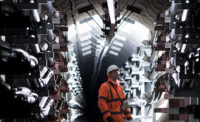While the UK construction industry is working to overcome the impending challenges of the nation's expected exit from the European Union, more specific hurdles are cropping up for equipment manufacturers in both the EU and UK.
Perhaps the most vexing local issue for Brexit—and the most visible—is the question of placing a hard border on the frontier of Northern Ireland, a part of the UK that has in recent years had a relatively soft border with the neighboring Republic of Ireland. It's a flashpoint hearkening back to a violent and sad history for a region that as recently as the 1990s was riven by sectarian conflict between mostly Protestant Unionists, who wanted to keep Northern Ireland as part of the UK, and mostly Catholic supporters of uniting the provinces with the Republic of Ireland. The Good Friday Agreement which largely halted the conflict in 1998 succeeded in great part because the hard border between Northern Ireland and the republic softened, deferring to the European Union’s agreements on free movement of goods and labor. While there are broader issues related to labor and commerce under debate for Brexit, the future of the border between Northern Ireland and Ireland is a major sticking point, not only for political issues but the robust equipment manufacturing sector that has taken root in Northern Ireland in recent decades.
Despite these concerns, Northern Ireland-based CDE Global is not wasting time worrying about Brexit. The equipment manufacturer is one of the world’s largest wet processing companies, with 2,000 projects around the globe. Its equipment extends into construction and demolition, waste recycling, dredging and sand washing—and it is headquartered in Cookstown, County Tyrone, Northern Ireland.
Cookstown suffered through the Troubles of the 1970s and even before that through slow deindustrialization of its historic linen and textile manufacturing base. CDE Global spokeswoman Angela Madden describes Brexit, however, as another day at the office for the firm, managing global projects as it does: from this perspective, political upheaval of one sort or another is occurring in many of the places the firm does business around the world, not just Europe. CDE is, in fact, focusing on growing: last year it acquired Caterpillar’s large manufacturing facility in nearby Monkstown, Northern Ireland, adding 300,000 sq ft of local space for making CDE’s complex equipment for mining and quarry projects. Last month it opened a new headquarters building in Cookstown, having grown its team by 65% in the last two years, and will open a state-of-the-art lab on the same site in the next year.
The firm has its eye on the EU's set targets for industrial recycling and will continue to do so regardless of Brexit, Madden says, because they believe the rest of the world will follow these targets and rely more heavily on industrial recycling in future. The company has good ties to the local Queen’s University in Belfast and plans for further growth regardless. “The world needs to find new ways to grow and meet demand for infrastructure while protecting finite and valuable natural resources such as sand and water,” she says. “Recycling is fast becoming a necessity the industry needs to explore, and increasingly presents both incredible business opportunities and environmentally sound practice.”
On the Continent, Keeping a Close Eye on Brexit
In Germany the mood is a bit more measured, but the construction industry appears to be “pricing in” future costs from work in the UK and, domestically, seeing fairly robust building activity. Concerns about Brexit focus mainly on the workforce—the availability of expertise and anxiety on the part of workers unsure of their residential status and near-term future. As early as a year ago the German Institute for Economic Research was finding skilled labor shortages in German cities with weekslong waiting times for plumbers, electricians and roofers, with the Deutsche Welle radio and news service reporting that recruiting from other European Union nations becoming more difficult.
In the fall of 2018, the FDP—an economically liberal, libertarian and pro-business party in Germany—asked the German government to outline the status of Brexit negotiations and the potential effects on the construction industry. Berlin’s answer: the government assumes closed contracts will be respected for construction projects and beyond that it’s difficult to judge future economic impacts. It ultimately depends, government analysts reported, on how the UK shapes its ongoing relationship with the EU.
Domestically however the German construction industry is riding something of a boomlet. Düsseldorf-based business newspaper Handelsblatt reports that last year the German construction industry booked €80 billion in orders (approx. $90 billion), its highest figure in 24 years, with Hochtief, the largest German builder, netting a 30% gain in profit at €541 million (approx. $611 million). European Central Bank rates remain relatively low. A long backlog in public infrastructure investment is starting to move under public pressure, as seen for example in the push complete Berlin’s long-delayed new airport and to upgrade and maintain bridges in order to avert tragedies such as the Morandi Bridge collapse last summer in Genoa, Italy.
Liebherr, Germany’s large industrial manufacturer and one of the world’s leading crane producers, says it is watching Brexit developments intensely. A company spokesperson says Liebherr’s view is that it is especially important to prevent an uncontrolled, or "hard" Brexit, with no formal concluded procedural agreements between the UK and EU. Before conditions for the movement of people and goods are defined in detail, forecasts for the company and its customers regarding the effects of Brexit are virtually impossible, though Liebherr says it will undertake whatever activities are necessary to protect its position and presence in the British market.





